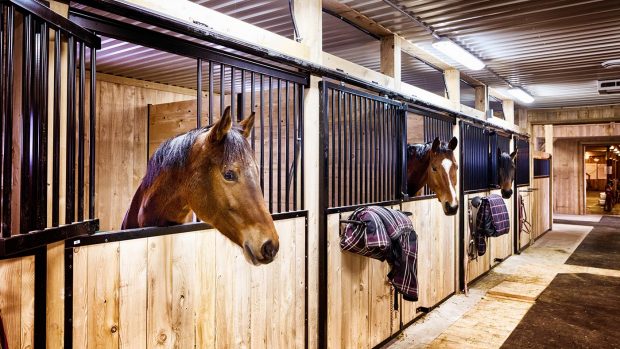Dark mornings, bad weather and horses stabled for longer periods can make winter a misery for horseowners. Keeping your horse out through the winter could reduce the time you need to spend looking after your four-legged friend, but what are the pros and cons?
The pros
- The horse has freedom, space and fresh air.
- In a mild winter, his natural food, grass, may keep growing slightly.
- A horse kept outdoors, well fed and sheltered, with or without a well-fitting rug, as appropriate, moves around with its friends and keeps himself half fit, which is a great boon to busyowners who want to work their horses at weekends, but have little time for maintaining fitness during the week.
- You save on bedding material and mucking out time, although field shelters must have droppings removed, and should be bedded down, if only with deep litter.
- You are not tied to such strict times for feeding and care, particularly if there is always a supply of hay or haylage in the field or shelter.
- You can save time on exercising – you don’t have to ride if you don’t want to.
The cons
- A horse kept outdoors loses weight if its diet is not adjusted accordingly. Stress from exposure and lack of company can also cause weight loss and health problems.
- A long, wet, muddy coat is a real bugbear when you want to ride; you won¨t be able to get it clean and dry enough to put tack on in less than an hour. Of course, rugs keep the saddle area dry.
- Although the horse¨s natural coat is protective, it can work against himif it is not reasonably clean, because it harbours skin parasites, favours the development of skin diseases and disguises the presence of both.
- The chill factor created by wind on a wet coat can be devastating. The natural coat holds within it a layer of insulating warm air next to the skin. However, when the coat is wet, it flattens and the layer of warm air disappears. Also, moisture is a good conductor of heat, so body heat passes quickly through the wet coat to the outside. The wind blows away any heat and the animal grows cold very rapidly, even to the extent of suffering from hypothermia, which can be fatal.
For more advice on wintering your horse out, including facilities, feeding, health checks and caring for your paddocks, see the December issue of HORSE magazine, on sale from 13 November.
To subscribe online to HORSE magazine at a special pre-Christmas reduced rate, click here.




